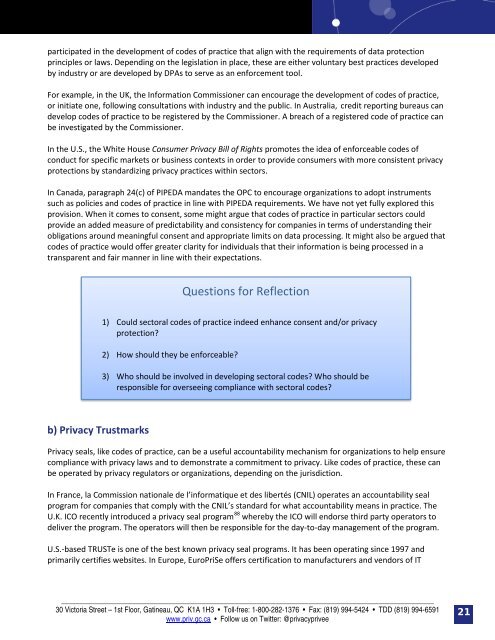Consent and privacy
consent_201605_e
consent_201605_e
You also want an ePaper? Increase the reach of your titles
YUMPU automatically turns print PDFs into web optimized ePapers that Google loves.
participated in the development of codes of practice that align with the requirements of data protection<br />
principles or laws. Depending on the legislation in place, these are either voluntary best practices developed<br />
by industry or are developed by DPAs to serve as an enforcement tool.<br />
For example, in the UK, the Information Commissioner can encourage the development of codes of practice,<br />
or initiate one, following consultations with industry <strong>and</strong> the public. In Australia, credit reporting bureaus can<br />
develop codes of practice to be registered by the Commissioner. A breach of a registered code of practice can<br />
be investigated by the Commissioner.<br />
In the U.S., the White House Consumer Privacy Bill of Rights promotes the idea of enforceable codes of<br />
conduct for specific markets or business contexts in order to provide consumers with more consistent <strong>privacy</strong><br />
protections by st<strong>and</strong>ardizing <strong>privacy</strong> practices within sectors.<br />
In Canada, paragraph 24(c) of PIPEDA m<strong>and</strong>ates the OPC to encourage organizations to adopt instruments<br />
such as policies <strong>and</strong> codes of practice in line with PIPEDA requirements. We have not yet fully explored this<br />
provision. When it comes to consent, some might argue that codes of practice in particular sectors could<br />
provide an added measure of predictability <strong>and</strong> consistency for companies in terms of underst<strong>and</strong>ing their<br />
obligations around meaningful consent <strong>and</strong> appropriate limits on data processing. It might also be argued that<br />
codes of practice would offer greater clarity for individuals that their information is being processed in a<br />
transparent <strong>and</strong> fair manner in line with their expectations.<br />
Questions for Reflection<br />
1) Could sectoral codes of practice indeed enhance consent <strong>and</strong>/or <strong>privacy</strong><br />
protection?<br />
2) How should they be enforceable?<br />
3) Who should be involved in developing sectoral codes? Who should be<br />
responsible for overseeing compliance with sectoral codes?<br />
b) Privacy Trustmarks<br />
Privacy seals, like codes of practice, can be a useful accountability mechanism for organizations to help ensure<br />
compliance with <strong>privacy</strong> laws <strong>and</strong> to demonstrate a commitment to <strong>privacy</strong>. Like codes of practice, these can<br />
be operated by <strong>privacy</strong> regulators or organizations, depending on the jurisdiction.<br />
In France, la Commission nationale de l’informatique et des libertés (CNIL) operates an accountability seal<br />
program for companies that comply with the CNIL’s st<strong>and</strong>ard for what accountability means in practice. The<br />
U.K. ICO recently introduced a <strong>privacy</strong> seal program 88 whereby the ICO will endorse third party operators to<br />
deliver the program. The operators will then be responsible for the day-to-day management of the program.<br />
U.S.-based TRUSTe is one of the best known <strong>privacy</strong> seal programs. It has been operating since 1997 <strong>and</strong><br />
primarily certifies websites. In Europe, EuroPriSe offers certification to manufacturers <strong>and</strong> vendors of IT<br />
_____________________________________________________________________________________________________<br />
30 Victoria Street – 1st Floor, Gatineau, QC K1A 1H3 • Toll-free: 1-800-282-1376 • Fax: (819) 994-5424 • TDD (819) 994-6591<br />
www.priv.gc.ca • Follow us on Twitter: @<strong>privacy</strong>privee<br />
21



